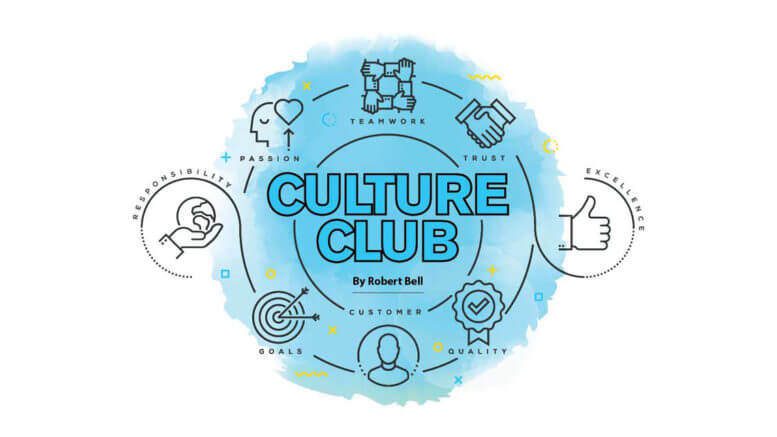A positive company culture may be more important than you may think
By all accounts, Paul Coconis was an astute businessman quick to spot an opportunity and turn it into dollars. While other furniture retailers came and left, Coconis and Furniture Discount House carved out a niche selling furniture in and around Zanesville, Ohio, for nearly 30 years.
“Get your bonus with Coconis!” shouted Coconis’ print and TV ads, offering bedroom sets for nine cents with the purchase of a two-piece living room suite. Even now, four decades later, Randy Coconis marvels at his father’s business prowess. “Dad’s marketing in many ways was well before its time,” says Randy, who took over running the store in 1981 and renamed it Coconis Furniture. “We still use that slogan and a lot of his marketing ideas – other businesses do, too.”
But Randy Coconis knows Dad was not perfect. That warmth and charm he turned on for customers was rarely on display for his employees, many of whom showed up to work every morning wondering where they stood with him. “Dad was never much about giving you praise,” says Randy. “Basically, his philosophy was ‘If I’m not giving you hell you’re doing a good job.’ ”
What Paul Coconis modeled as the ways a retailer interacts with his employees might have worked 60 years ago, but it falls woefully short in today’s business climate where a company’s culture can lift or sink any number of key performance indicators.

Today, with four stores in central Ohio, Coconis Furniture is one of the Midwest’s most successful independent furniture retailers. Despite that success, Randy Coconis sometimes wonders if that growth, which came entirely under Randy’s leadership, would have come sooner had his father instilled a positive culture when he held the keys to the store.
“That culture that was missing?” Randy says. “It’s a big reason we are who we are today. I’m a firm believer that whatever you put into developing a positive mind-set or culture at work, you more than reap in the returns.”
Company culture counts. Tying work performance to environment has been a doctrine of the business world for decades but is being promoted now more than ever. Most of us can name companies known not only for their financial success but also their accomplishments in creating a culture in which employees are proud and happy to belong. Look no further than Southwest Airlines and Chick-fil-A. The same holds true for companies with a negative culture. Uber and Wells Fargo, anyone?
Company culture can be a vague concept, something you can’t put on paper, but you experience it when you enter almost any store. Culture is the values and actions store owners, managers and employees bring to work with them each day that ultimately create a (pick one) unique/passionate/miserable business environment. It all depends on the store’s culture.
Pick almost any Key Performance Indicator and experts will show how your store’s company culture directly affects that measurement’s bottom line. A 2016 study of car dealerships by a group of corporate researchers and university professors found that a positive corporate culture – one that engages and motivates employees – can pad a company’s bottom line.
Conversely, the same study showed a company’s success doesn’t necessarily translate into a positive culture – and companies that succeed despite a negative culture are likely to see their performance decline over time.
Eric Easter learned the importance of a healthy company culture the hard way when he was hired to turn around a struggling furniture company in Indianapolis in the early 1990s. Within the first few weeks, Easter realized his mistake. The company was a toxic mix of paranoia and negative employees. “Maybe one of the most miserable experiences in my life,” says Easter.
Easter didn’t hang around long. These days he’s president and CEO of Kittles Furniture, a proud HFA member. One of the reasons Easter says he joined Indianapolis-based Kittles was because of a strong culture that permeated the company’s every department. Easter supports that culture daily, showing up every morning at Kittles’ distribution center.
Easter makes sure he’s there by 8 a.m. so he can catch third-shift employees before they head home and first-shift employees just showing up. In a department frequently neglected by many furniture retailers, Easter catches up on employees’ personal lives – a worker whose child is about to graduate from high school or another whose mother just got out of the hospital. He’ll talk about weekend plans and ask them what procedures are working in the warehouse and which ones need to be tweaked. Before he leaves, there will be laughs, hugs and high-fives as Easter connects with employees personally and professionally.


None of this is for show. Easter genuinely cares, but he also knows Kittles’ success hinges on a top-down culture that inspires workers not just to show up, but to excel every day. “I want every employee to feel they’re part of this company’s success because they are,” says Easter. “Human beings like to feel valued and feel their work contributes to a company’s success. When they do, they’re going to want to be a part of that success.”
That, says Joe Milevsky, is company culture in a nutshell. Milevsky is president of JRM Sales & Management, a consulting company for furniture retailers. “Company culture is different from your physical store because you can’t see it or touch it, but customers can feel it whenever they walk in to your store.”
Randy Coconis wasn’t always aware of a culture’s impact on a company. When he took over the family business, he was a chip off his father’s distant block. It wasn’t until about 20 years ago when he met Milevsky that he realized the sway a positive culture can hold over a company. Milevsky told him to spend two weeks complimenting his staff, from sales associates to delivery drivers. Not false praise, but authentic gratitude when they did a job well. “It was amazing,” says Randy. “The reaction I saw from people – their enthusiasm went up, their sales went up. That’s when I saw the power of company culture.”
With Randy slowly pulling back from his daily responsibilities at the store, the task of maintaining a positive company culture is left to his sons, Bo and Chad, and general managers Les McMorrow and Jeff Tracy. “They’re very good at keeping everyone positive, checking in with them if things aren’t going well and encouraging them.” Even though he spends less time in the office these days, Randy still finds time to send emails to employees, praising and reaffirming them for a job well done. “We’re a completely different company – a better company – than we were 20 years ago, and a big part of that is our culture,” he says.
McMorrow agrees. “I don’t work for a boss,” says, McMorrow, 27 years and counting as a Coconis employee. “I work for a friend, and everyone feels that way here.”
McMorrow started out in sales at the store and is now the general manager of the company’s store in Heath, Ohio. “When you have the right culture, when you treat people like they’re family and not a number, they have the best interest of the store in their hearts. They want to make sure that delivery is perfect. They feel free in sharing ways to improve the store.”
Company culture is more than just praise. Randy and others say there needs to be purpose and strategy behind any attempt at implementing or changing a store’s culture. A few years ago, HFA members Andrew and Noah Tepperman of Tepperman’s were mapping out a strategic plan that the Canadian retailer hopes to achieve by 2025. The brothers came up with six guiding principles that would shape how the company moves forward: Respect, trust, teamwork, innovation, passion and family. Those values are geared not just toward customers, but employees, too, Andrew Tepperman says.

“Everything is connected,” Andrew says. “If we make a decision, we need to know how that decision is connected to or aligns with those values.”
Those principles determine how Tepperman’s employees are treated, the furniture they carry and the partnerships they forge with outside vendors. But it’s the way Tepperman’s (and other stores with a strong company culture) treats its employees that impacts customers most.
In an industry where it is increasingly difficult to differentiate one retailer from another, company culture can be the difference, says Easter. “Your store’s culture is yours alone,” he says. “No other store can replicate our culture. That’s not to say another furniture store can’t have a good company culture because a lot do. But they could never copy ours and we can never replicate theirs. That’s good news for both of us.”
So what does a positive culture in your store look like? In his book “The Employee Experience Advantage,” author Jacob Morgan lists some attributes retailers should focus on:
- Your store is viewed positively. Just like when you bring home a significant other to meet the family for the first time and want to get their approval, employees want to feel good about the company they work for.
- Employees feel valued. Employees want to know their work is appreciated. That means their ideas are listened to, and they are compensated appropriately.
- Referrals come from employees. Your store depends on referrals. The same should be true of the workplace — if it’s a good place to work, employees should naturally want to share it with others.
- The chance to learn. One of the worst feelings for employees is that they are stuck in their jobs with nothing new to learn and nowhere to go. Ongoing training and new technology encourage employees to learn something new and keep them engaged and moving forward.
- Executives and managers are coaches and mentors. The days of Paul Coconis sitting at the top of the organization and looking down on employees are over. Store owners and managers are on the ground, interacting with employees, encouraging and coaching.
How does a furniture store cultivate a positive company culture? Milevsky says it starts at the top.
“It’s your store, you’re the one who is going to shape your culture,” he says. “Your beliefs, your values will determine how your culture will grow. If you’re neutral or indifferent as a leader or manager, don’t be too surprised if your employees are that way with your customers. They’re only reflecting your culture.”
Milevsky understands that not every retailer can be the change they want for their store. That’s where human resources come into play. “You need to be hiring the right people. If you can’t display the passion for your store, you better find someone who can and hire them.”
Easter says the human resources office (but, really, every department) at Kittles is centered around a servant’s attitude for customers. “That’s the first thing we’re looking for in a future hire is whether we think that person will fit into our culture,” he says. “We can teach them some of the finer points of our culture, but first they have to possess that servant’s attitude.”
An added bonus to a strong company culture is a higher retention rate. Milevsky says he’s never happier than when he’s surrounded by his three grandchildren. “I don’t want the day to end when I’m with them,” he says. “That’s what a strong company culture does for your store. You’ve given your employees the passion and power to want to show up every day and not want to go home.”
Or work anywhere else. Since creating his company’s guiding principles and enhancing its company culture, Andrew Tepperman says he occasionally checks out his store’s feedback on career website Glassdoor. Among other furniture retailers in the area, Tepperman says his store routinely has the highest employee reviews.
Easter agrees. “We have people leave who think maybe the grass is greener somewhere else and they come back saying they didn’t know how good they had it,” he says. “Many of our employees think of Kittles as a home, not a stepping stone.”











